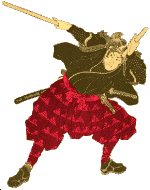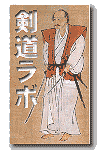 | |
Why the name Musashi ? It's a tradition in the Kyokushinkai-karate that a kyokushinkai-school uses the name of a well known period of the history of Japan or a famous person of a certain period from Japan. I, Sjaak van deVelde, have chosen the name "Musashi" because this samoerai discribes a certain philosophy that appeals to me. After reading his book I got more and more interested inthe philosophy of Musashi. Sosai Masutatsu Oyama was also inspired by Musashi. After reading Go Rin No Sho Sosai Mas Oyama went to the mountains and started his " Mountain Training ". Who was Myamoto Musashi ?  Myamoto Musashi was born in 1584 and was at an early age one of the most famous samoerai's of Japan. Very many other samoerai's after him took him as an example and recent books and films are inspired by his way of life. Myamoto Musashi was born in 1584 and was at an early age one of the most famous samoerai's of Japan. Very many other samoerai's after him took him as an example and recent books and films are inspired by his way of life.At the age of 30 Musashi has won more than 60 fights and was considered invincible. That's why he decided to dedicate the rest of his life to perfect his strategy. He became a famous teacher ( Sensei ) in Kendo, Japanese sword fighting. At the end of his life Musashi went to a cave on Kyushu and a few weeks befor his death he summari-zed his way of life in a small book, Go Rin No Sho ( a book of five rings ). This short and very practical text contains the heart of his Strategy of sword fighting and his life. This strategy has a strong influence of Zen and the original Shinto religion. There is a translation of Go Rin No Sho that is called The Strategy of a Samoerai. This book can be read by everyone and the more you read it, the more you discover the different levels of meaning. The words Musashi wrote were his last wil, they lead you to the extraordinary way he lived. From youth my heart has been inclined toward the Way of strategy. My firstduel was when I was thirteen, I struck down a strategist of the Shintoschool, one Arima Kihei. When I was sixteen I struck down an able strategistTadashima Akiyama. When I was twenty-one I went up to the capital and metall manner of strategists, never once failing to win in many contests.After that I went from province to province duelling with strategist ofvarious schools, and not once failed to win even though I had as many assixty encounters. This was between the ages of thirteen and twenty-eight ortwenty-nine. When I reached thirty I looked back on my past. The previous victories werenot due to my having mastered strategy. Perhaps it was natural ability, orthe order of heaven, or that other schools' strategy was inferior. Afterthat I studied morning and evening searching for the principle, and came torealise the Way of strategy when I was fifty. Since then I have lived without following any particular Way. Thus with thevirtue of strategy I practise many arts and abilities - all things with noteacher. To write this book I did not use the law of Buddha or the teachingsof Confucius, neither old war chronicles nor books on martial tactics. Itake up my brush to explain the true spirit of this Ichi school as it ismirrored in the Way of heaven and Kwannon. The time is the night of thetenth day of the tenth month, at the hour of the tiger (3-5 a.m.) ..... " Calligraphy on the right by
Myamoto Musashi represents "Senki" (War Spirit). Itreads: "The Moon in the cold stream like a
mirror". Click the picture to read other chapters from the book. More info:Tournaments |
 " I have been many years training in the Way of strategy, called Ni TenIchi Ryu, and now I think I will explain it in writing for the first time.It is now during the first ten days of the tenth month in the twentieth yearof Kanei (1645). I have climbed mountain Iwato of Higo in Kyushu to payhomage to heaven, pray to Kwannon, [God(dess) of mercy in Buddhism. -Slaegr] and kneel before Buddha. I am a warrior of Harima province, ShinmenMusashi No Kami Fujiwara No Genshin, age sixty years.
" I have been many years training in the Way of strategy, called Ni TenIchi Ryu, and now I think I will explain it in writing for the first time.It is now during the first ten days of the tenth month in the twentieth yearof Kanei (1645). I have climbed mountain Iwato of Higo in Kyushu to payhomage to heaven, pray to Kwannon, [God(dess) of mercy in Buddhism. -Slaegr] and kneel before Buddha. I am a warrior of Harima province, ShinmenMusashi No Kami Fujiwara No Genshin, age sixty years.
